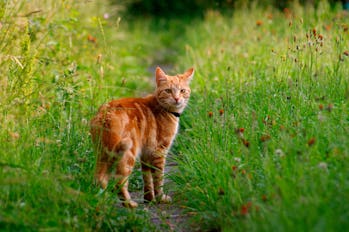Breaking: Big Cat Public Safety Act passes the US Senate and heads to President Biden’s desk

WASHINGTON—The U.S. Senate just handed the Large Cat Public Security Act (H.R. 263, Senate companion bill S. 1210) by unanimous consent. This follows the bill’s passage by the U.S. Residence of Representatives on July 29. The legislation prohibits preserving tigers, lions and other massive cat species as animals, and bans general public call with these species, such as paid interactive experiences like cub petting. The laws was sponsored and championed by Sen. Richard Blumenthal, D-Conn, Sen. Susan Collins, R-Maine, Rep. Michael Quigley, D-Ill., and Rep. Brian Fitzpatrick, R-Pa. The invoice now goes to the White Residence to be signed into regulation by President Biden, who has expressed assistance for it.
Kitty Block, president and CEO of the Humane Society of the United States and CEO of Humane Culture Legislative Fund, claimed: “An terribly cruel period for large cats in the U.S. lastly arrives to an conclude with the passage of the Massive Cat Community Safety Act. We’ve been battling for this instant for many years because so numerous so-identified as ‘Tiger Kings’ have been breeding tigers and other significant cats to use them for earnings. And the moment the cubs improve also big for cub-petting or selfies, these lousy animals get dumped at roadside zoos or passed into the pet trade, which is not only a horrible completely wrong for the animals, but also a risk to community safety. Now that the Significant Cat General public Safety Act will become law, it is the commencing of the conclusion of the huge cat disaster in the U.S.”
Sara Amundson, president of Humane Society Legislative Fund, claimed: “Passage of the Major Cat Community Protection Act addresses a reckless cruelty that has festered for several years. For way too very long tiger cubs have been exploited by ‘pay to play’ operators like Joe Exotic and Doc Antle who profited from charging persons for image ops of their small children holding these potentially dangerous wild animals. Due to the fact 1990, much more than 400 incidents involving captive significant cats have happened in 46 states and the District of Columbia. 5 little ones and 19 older people have been killed and hundreds of many others injured, some dropping limbs or suffering other traumatic accidents. The bill’s enactment stops what was an infinite cycle of exploiting and mistreating major cat cubs, who were being dumped soon after they grew as well substantial for image ops. The legislation’s lead sponsors Sen. Richard Blumenthal, Sen. Susan Collins, Rep. Mike Quigley and Rep. Brian Fitzpatrick rightly observed this as a community protection danger and a gross cruelty. We urge President Biden to indicator the bill devoid of delay.”
There are untold numbers of captive tigers, lions, leopards and other large cats in the U.S., most living in shoddy roadside zoos, personal menageries or in households as pets. The existence of these cats in our communities is often the consequence of predatory corporations that function substandard amenities and cost the public for photo ops and for feeding and petting sessions with infant tigers and other major cats. Bred specially to change a earnings, cubs are torn from their mothers at birth and subjected to neglect and mistreatment as props for these community encounters. This exploitation takes place for a number of months right until the animals have grown far too huge to be managed. They are then warehoused in roadside zoos, marketed into the pet trade, and some are killed. In the meantime, in a never-ending cycle, new cubs have been generated, utilised and disposed of, rising the selection of captive massive cats in backyards and basements throughout The united states.
These massive, perilous predators are usually held in little, barren cages. When sold to personal entrepreneurs they may be held in basements or backyards the place they have no indicates to specific their intricate behavioral demands, are deprived of veterinary care and a proper diet program and are sometimes subjected to cruel treatments like declawing in misguided and unsuccessful tries to make them safer to tackle.
Maintaining big cats as animals is not only inhumane but is also a critical community basic safety challenge. Considering the fact that 1990, additional than 400 harmful incidents involving captive major cats have transpired in 46 states and the District of Columbia. 5 young children and 19 adults have been killed and hundreds of other men and women wounded, with some getting rid of limbs or suffering other traumatic injuries. When captive major cats attack or escape, nearby legislation enforcement specialists must answer even although they usually deficiency the schooling or sources to cope with these kinds of emergencies.
India, Elsa and Loki, previous “pet” tigers now residing at Black Beauty Ranch—a Texas sanctuary run by the Humane Society of the United States—embody what has happened to a lot of large cats in this country. Loki arrived at Black Beauty in February 2019 soon after currently being observed in an deserted Houston household where by he was dwelling in a cage so modest, he could scarcely move. In 2021, the Bexar County Sheriff’s business seized Elsa following responding to a call about a crying animal and finding the six-month-aged tiger outdoor in freezing temperatures and sporting a harness. Just a number of months later, authorities rescued India right after a viral online video showed him wandering the streets of a Houston neighborhood.
Sen. Richard Blumenthal, D-Conn., claimed: “The Big Cat Public Basic safety Act will close the horrific exploitation of huge cats and bolster general public basic safety. These wonderful but impressive predators should have to are living in the wild, not be saved in captivity for people’s entertainment—even as cubs. I’m thrilled that, following a groundswell of community and bipartisan aid, this bill I have very long advocated for will develop into legislation.”
Sen. Susan Collins, R-Maine, stated: “Big cats like lions, tigers and cheetahs belong in their purely natural habitats, not in the arms of private owners the place they are far too generally matter to cruelty or poor care. Our legislation will prohibit the private ownership of huge cats, which threatens the basic safety of the animals and the general public and harms conservation endeavours. I am happy that our colleagues supported our bipartisan effort to improve the welfare of animals.”







